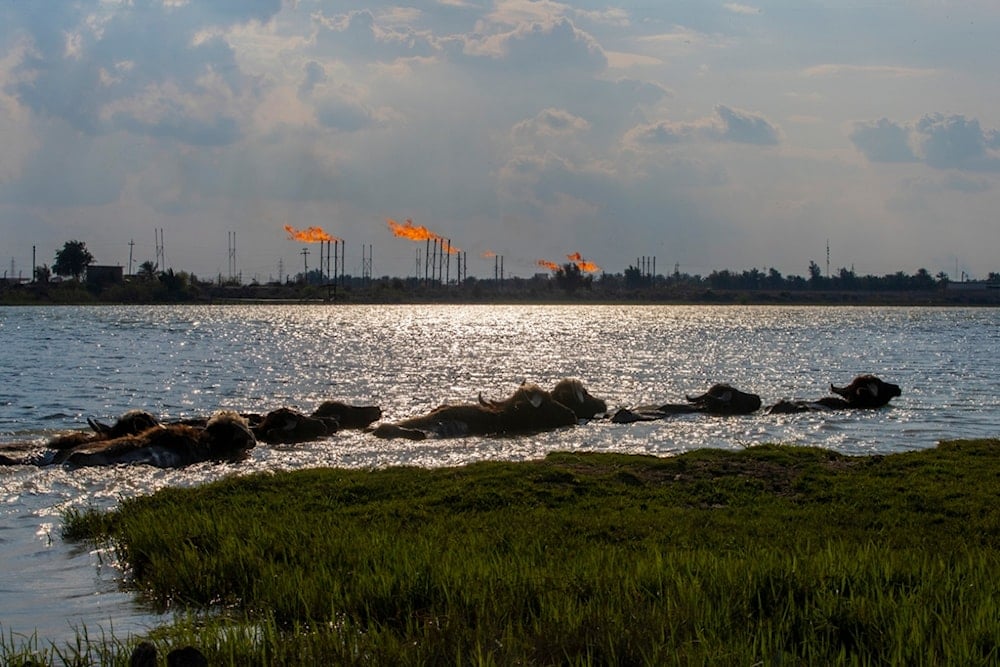China's independent oil firms push into Iraqi giants-dominated market
Independent Chinese oil firms are investing billions in Iraq's energy sector, boosting oil production and securing major contracts as Western oil majors retreat.
-

Water buffaloes swim near the Nihran Bin Omar oil field north of Basra, Iraq, Wednesday, March 22, 2023. (AP)
Chinese independent oil firms are increasing their activities in Iraq, committing billions of dollars in investments to the second-largest OPEC producer, while certain international oil majors have reduced their presence in a market largely controlled by China's major state-owned energy companies.
Attracted by more favorable contract terms, smaller Chinese oil producers are expected to nearly double their production in Iraq, reaching approximately 500,000 barrels per day by 2030, according to estimates from executives at four of these companies, a projection that has not been previously disclosed.
For Baghdad, which is still attempting to attract international oil majors, the expanding role of mostly private Chinese companies signals a strategic shift as Iraq faces increasing pressure to speed up oilfield development, according to several Iraqi energy officials, who noted that in recent years, the country's oil ministry had resisted China's growing dominance over its oilfields.
Many of the smaller Chinese firms, which are led by former executives from China's state energy giants, view Iraq as a strategic opportunity to capitalize on their ability to operate more efficiently and develop projects at a quicker pace, particularly in fields that may be considered too marginal or uneconomical for larger Western or Chinese state-owned oil majors.
Symbiotic relationship
Facing limited growth opportunities in China's state-controlled oil and gas sector, these smaller firms are following a broader trend seen across Chinese heavy industries, where companies are expanding overseas to deploy excess production capacity and technical expertise in search of new markets.
Chinese firms such as Geo-Jade Petroleum Corp, United Energy Group, Zhongman Petroleum and Natural Gas Group, and Anton Oilfield Services Group gained significant attention last year after securing nearly 50% of the contracts awarded during Iraq's exploration licensing rounds.
Executives from smaller Chinese oil firms note that Iraq's investment environment has strengthened amid increasing political stability, with Baghdad actively working to draw in both Chinese and Western energy companies through more favorable policies.
Iraq aims to increase its oil output by over 50%, targeting more than 6 million barrels per day by 2029, while China's CNPC currently contributes more than half of the country's production through its operations at major fields, such as Halfaya, Rumaila, and West Qurna 1.
Iraq's move to replace fixed-fee contracts with profit-sharing agreements last year, a change aimed at reviving stalled projects following ExxonMobil and Shell's reduced involvement, proved particularly attractive to China's independent oil companies.
Chinese firms are more advantageous
These independent Chinese operators demonstrate greater agility than their larger state-owned counterparts and show more willingness to assume risks compared to many potential investors in the Gulf's energy sector.
According to Ali Abdulameer from state-run Basra Oil Co, which handles contract negotiations with foreign firms, Chinese companies present a competitive advantage through attractive financing options, cost reductions achieved by utilizing Chinese labor and equipment, and a willingness to operate on thinner profit margins in exchange for securing long-term agreements.
Chinese executives noted that their smaller firms can bring Iraqi oilfields into production within just two to three years, a significantly faster timeline compared to the five to ten years typically required by Western companies.
Million-dollar deals
According to Dai Xiaoping, CEO of Geo-Jade Petroleum, these independent operators have reduced the average cost of drilling a development well in Iraq's major oilfields by approximately 50% compared to ten years ago, bringing it down to the $4-5 million range.
In May, a consortium led by Geo-Jade Petroleum reached an agreement to invest in the South Basra development project, which involves boosting production at Iraq's southern Tuba field to 100,000 barrels per day while constructing a new 200,000-bpd refinery. Geo-Jade pledged $848 million in funding and is aiming to restore output at the largely dormant field to approximately 40,000 bpd by mid-2027, Dai said to reporters.
According to a Zhenhua Oil official, the company, which partnered with CNPC in a $3 billion deal to develop the Ahdab oilfield in 2008, Iraq's first major foreign-invested project after Saddam Hussein was toppled in 2003, now aims to double its production to 250,000 barrels per day by 2030.
In June, Zhongman Petroleum revealed a $481 million investment plan targeting the Middle Euphrates and East Baghdad North blocks it secured during Iraq's 2024 licensing round.

 5 Min Read
5 Min Read








